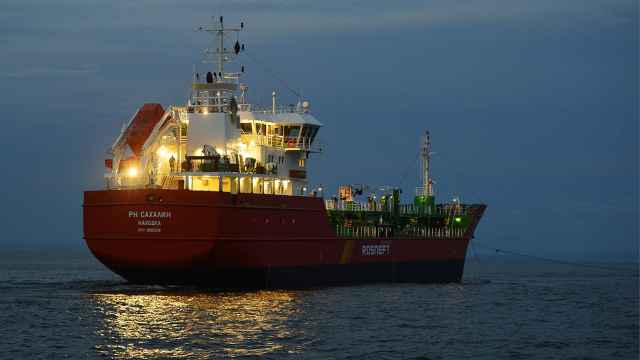Russia violated the rights of Yukos, the European Court of Human Rights ruled Tuesday. But the court rejected a contention that the prosecution of Yukos was politically motivated and deferred any ruling on nearly $100 billion in damages.
Authorities were unfair in meting out punishment to the the now-defunct oil company over tax violations and did not give Yukos enough time to prepare its defense, said the court in Strasbourg, France.
The decision is open for a months-long appeal process available to both sides.
The court’s nine-judge panel found that Russia violated three articles of the European Convention on Human Rights, including the right to a fair trail. The court also found the enforcement proceedings were disproportionate, a ruling that the Justice Ministry said Tuesday was based on “opinions.”
The court, however, denied an allegation that the state misused legal procedures to dismantle Yukos.
Russia’s envoy to the court, Georgy Matyushkin, told Interfax that he was “satisfied with the ruling overall.”
Mikhail Barshchevsky, a high court lawyer for Russia, said the Strasbourg court’s rejection of political motivation is “an indisputable victory for Russian envoys in the court,” RIA-Novosti reported.
Yukos representatives, however, said they consider the ruling to be their win.
The company’s former chief financial officer, Bruce Misamore, said the ruling about political motivation was one of “the least of the concerns,” while former Yukos chief executive Steven Theede said the decision that found enforcement procedures to be disproportionate was key because “all of the factors that led to Yukos dismantle were brought about by enforcement procedures.”
The finding could still embarrass Russia and hurt its efforts to win back international investors scared off by Yukos and other legal cases in recent years. But its weight on the investment climate is unlikely to be lasting, analysts say.
Chris Weafer, chief strategist at investment bank Troika Dialog, said in a note to investors Tuesday that a negative ruling “would be a PR nightmare rather than a financial disaster.”
“The saving grace is that investors are more focused on more substantive global events, for example, Greece and the Fed meeting, so any knee-jerk negative reaction should be relatively short-lived,” he said.
Yukos sought $98 billion in damages, the largest claim in the court’s 50-year history and one of Russia’s biggest legal challenges to date.
The company — whose primary subsidiary once produced as much oil as all of Libya — was dismantled by authorities after the 2003 arrest of its founder and owner, Mikhail Khodorkovsky. His supporters say then-President Vladimir Putin’s Kremlin mounted an orchestrated effort to destroy the tycoon, seen as a threat to Putin’s rule.
Khodorkovsky offered his view on what happened in 2003 in an opinion piece published in Kommersant Vlast on Monday: “Those who made up criminal cases against me and my colleagues simply wanted to take for free the country’s most profitable oil company with a market value of $40 billion.”
The European court found the question of damages “is not ready for decision” and gave both parties three months to reach a settlement. If they do not, the court will rule at later on whether to order any damages.
Theede said in a conference call that it is “premature” to talk about the settlement, but added that he sees nothing to justify “a position to make changes” in the sum of damages they’re seeking.
The court has repeatedly found Russia in violation of the 1950 European Convention on Human Rights, and deals with more cases involving Russia than any other country.
Misamore said the management is seeking only compensation, not the assets that went on to be auctioned to state-owned energy firms. “There hasn’t been any intent to put Yukos back together again from pieces that went to Rosneft or Gazprom,” he said.
A Message from The Moscow Times:
Dear readers,
We are facing unprecedented challenges. Russia's Prosecutor General's Office has designated The Moscow Times as an "undesirable" organization, criminalizing our work and putting our staff at risk of prosecution. This follows our earlier unjust labeling as a "foreign agent."
These actions are direct attempts to silence independent journalism in Russia. The authorities claim our work "discredits the decisions of the Russian leadership." We see things differently: we strive to provide accurate, unbiased reporting on Russia.
We, the journalists of The Moscow Times, refuse to be silenced. But to continue our work, we need your help.
Your support, no matter how small, makes a world of difference. If you can, please support us monthly starting from just $2. It's quick to set up, and every contribution makes a significant impact.
By supporting The Moscow Times, you're defending open, independent journalism in the face of repression. Thank you for standing with us.
Remind me later.





